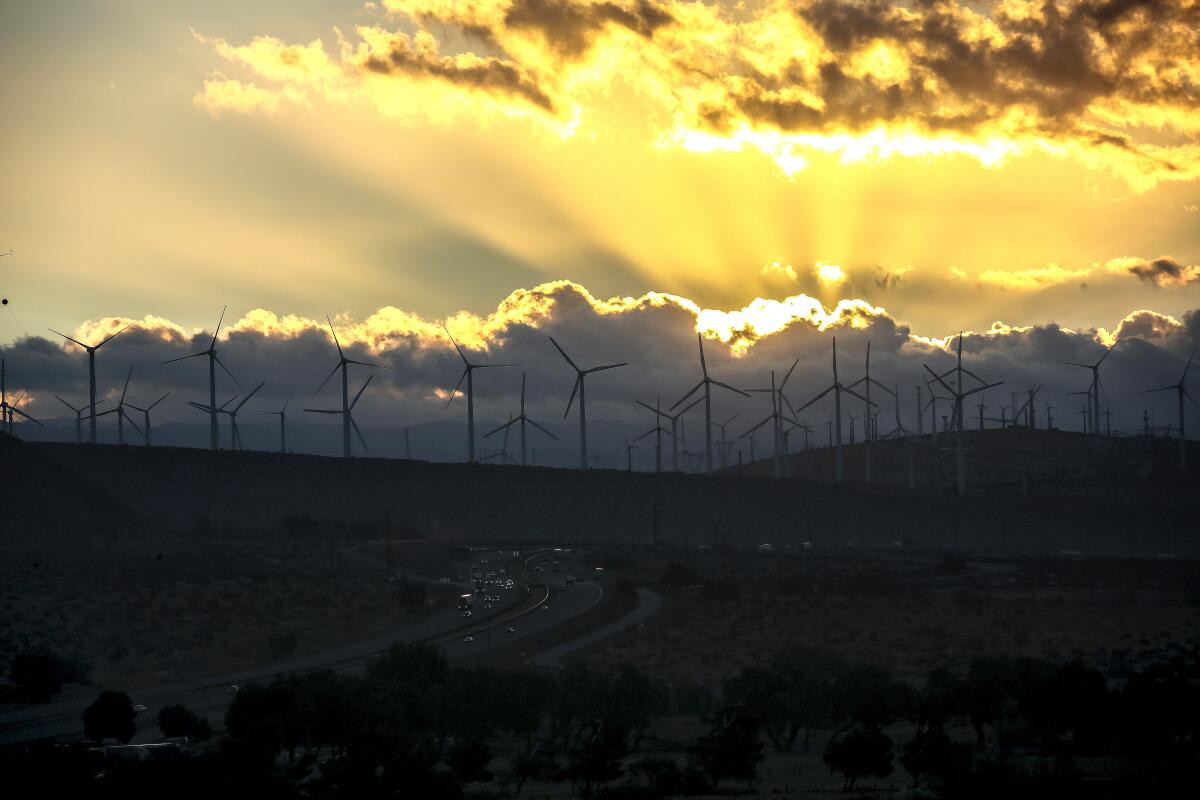Review: Dark doings under the hot sun in ‘Palm Springs Noir’

On the Shelf
'Palm Springs Noir'
Edited by Barbara Demarco-Barrett
Akashic: 304 pages, $17
If you buy books linked on our site, The Times may earn a commission from Bookshop.org, whose fees support independent bookstores.
Like the rest of Southern California, Palm Springs is built on a precarious relationship with water. Without the aquifer underneath the Coachella Valley, the expensive landscaping, midcentury modern hotels and hungover tourists wouldn’t survive. Water tells the lie that everything is fine in the desert cities and forever will be, no matter what the dust whispers at 2 a.m.
“Palm Springs Noir,” the latest anthology in the long-running Noir series from Akashic Books, is listening to the dust. And beware: As collection editor Barbara DeMarco-Barrett points out in her introduction, that whisper of dust can become a blinding storm.
Contrary to popular belief, noir doesn’t require a bleak city street for its setting. Nor water, for that matter. Noir thrives on secrets, lies and lust, all flowing plentifully through the jewel in the Coachella Valley’s fragile crown. In these 14 stories from writers who either live in or have ties to the area, including Janet Fitch, Alex Espinoza, T. Jefferson Parker and J.D. Horn, money, drugs, sex or freedom are all objects of desire. Sometimes, as in Horn’s clever story “The Stand-In,” the lies themselves are the most coveted prize.
“Palm Springs Noir” leaves the sliding glass door open for ghosts present as well as past. One of the original peoples of Southern California, the Cahuilla, are nodded to in Eduardo Santiago’s wistful and funny “The Ankle of Anza,” which follows an addict-turned-cat burglar fresh from another failed stint at Betty Ford. In Fitch’s entertaining “Sunrise,” the narrator’s life was so ruptured by a con man that she considers herself the walking dead. Only a chance at revenge gets her blood pumping again. In Eric Beetner’s cautionary tale, “The Guest,” one of a few that touch on the lifeblood of Palm Springs’ Airbnb economy, a dead body turns up in a pool, an accidental death that prompts haunting and murder.
A new collection from author of dark tales Todd Golberg trades urban L.A. noir for the more sprawling menace of the Inland Empire and other exurbs.
Any city that worships Elizabeth Taylor’s Big Caftan Energy and the Rat Pack at their smarmiest (Sinatra shows up several times, maybe too much, in these stories) has a healthy relationship with camp, and “Palm Springs Noir” follows suit. Tod Goldberg’s memorable contribution, “A Career Spent Disappointing People,” about a partnership gone sour between two wedding DJ-singers, embraces a weird clown and a trunkful of body parts. By far the collection’s campiest note is hit by Michael Craft in the delightful “VIP Check-In.” When a wheelchair-using sugar daddy is screaming for “pink fluff,” his name for booze-soaked raspberry trifle, one can practically see John Waters in the background clapping with glee.
In Los Angeles, the rich don’t know the names of their pool “boys,” but in Palm Springs those men have a past, a motive and a weapon — the pool itself. The well-off and the working class sometimes form a tenuous alliance, as in DeMarco-Barrett’s “The Water Holds You Still.” Several characters are trying their best, or worst, to exit the ranks of the working poor. One of the most powerful lessons in how hard this transformation can be comes in Chris J. Bahnsen’s “Octagon Girl.” The titular woman is an MMA card girl who takes up with a fighter in hopes of giving her son a father figure. Needless to say, it doesn’t work out that way, and Bahnsen captures the desperation of a woman who wants to know her mind — but doesn’t.
The outlaw and the outcast have always found a home among the yucca and cholla in the desert sprawl of Palm Springs. Rob Roberge’s story, “The Expendables,” based in the desolate and ironically named Wonder Valley, tracks a scientist who was both victim and perpetrator of MK-ULTRA, one of the CIA-led mind control experiments meant to combat communism. “If people knew the truth about the scope of this shadow world,” he writes of the government-sponsored torture, “they would realize what a fragile endeavor society actually is.”
The CNN anchor talks about “The Devil May Dance,” an L.A. thriller about Sinatra and RFK, the Church of Scientology and the underbelly of Hollywood.
The desert provides cover for far more than lizards and jackrabbits. In the book’s final piece, Espinoza’s “The Salt Calls Us Back,” a cult — but don’t call them that to their faces — takes the ruined Salton Sea as its base. The collection’s creepiest story ends with a heinous sacrifice — effectively a closing statement: For all the playfulness of the genre and the location, the wisecracks and the kidney-shaped pools, there is an unmanageable darkness waiting to seep in, like so much blood in the pool water.
More to Read
Sign up for our Book Club newsletter
Get the latest news, events and more from the Los Angeles Times Book Club, and help us get L.A. reading and talking.
You may occasionally receive promotional content from the Los Angeles Times.







